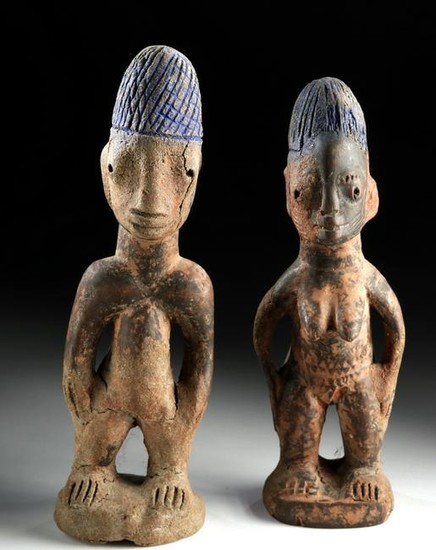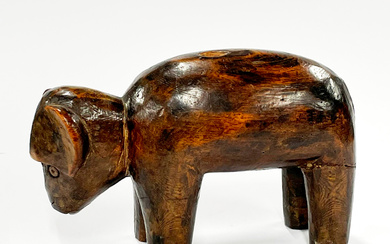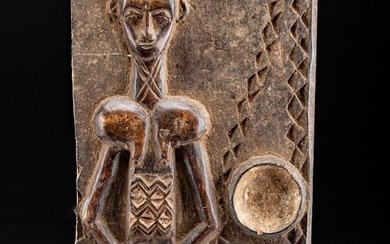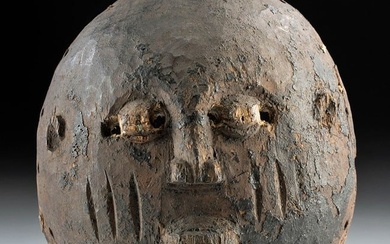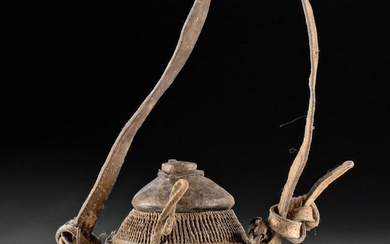Early 20th C. African Ibeji Standing Twin Figures (pr)
**Originally Listed At $600**
West Africa, Nigeria, Yoruba peoples, ca. early 20th century CE. A matched pair of hand-carved wooden Ere Ibeji twin figures - one male and one female. The figures have similar faces composed of large eyes with central perforations that once contained metal pupils, straight noses, parted lips suggesting slight smiles, the female with scarification marks on her cheeks, all beneath incised conical coiffures adorned with indigo blue pigment. The figures stand atop attenuated, spread legs and broad feet; each possesses a slightly-distended abdomen, rounded shoulders, and long arms - the female with perky breasts and bands of triangular marks over her abdominal/womb area. Both present areas of red cinnabar and encrustation suggesting the remains of libations (offerings). A wonderful pair of carved twin figures! Size: 10.125" H (25.7 cm)
The Yoruba are known for their carved sculptures of deceased male and female twin figures, known as Ibeji. The Yoruba have one of the highest number of twin births in the world, four times higher than in Europe, for example. Ibeji are known to the Yoruba as two people who share one soul. According to the Yoruba, twin effigies like this example are believed to influence the daily lives of family members and especially the life of the other twin. If one of the human twins dies, whether as a child or an adult, the surviving human twin is considered to have little hope of living with only half a soul. Further, the deceased's soul must have a place to reside, hence the reason for creating Ere Ibeji figures like this. As such, they are traditionally honored with prayers, offerings, and libations to ensure peace and happiness in the afterlife.
Provenance: private Los Angeles, California USA Collection
All items legal to buy/sell under U.S. Statute covering cultural patrimony Code 2600, CHAPTER 14, and are guaranteed to be as described or your money back.
A Certificate of Authenticity will accompany all winning bids.
We ship worldwide to most countries and handle all shipping in-house for your convenience.
#145791
Condition Report: Both display wonderful age wear and patina as well as nice remains of blue indigo pigmentation on coiffures. Areas of red cinnabar and encrustation, perhaps from libation offerings and/or earthen deposits. Age cracks to face and body of male figure. Chips to bases. Expected surface wear with abraded areas and nicks. Inactive insect loss to coiffure of female.
View it on
Estimate
Time, Location
Auction House
**Originally Listed At $600**
West Africa, Nigeria, Yoruba peoples, ca. early 20th century CE. A matched pair of hand-carved wooden Ere Ibeji twin figures - one male and one female. The figures have similar faces composed of large eyes with central perforations that once contained metal pupils, straight noses, parted lips suggesting slight smiles, the female with scarification marks on her cheeks, all beneath incised conical coiffures adorned with indigo blue pigment. The figures stand atop attenuated, spread legs and broad feet; each possesses a slightly-distended abdomen, rounded shoulders, and long arms - the female with perky breasts and bands of triangular marks over her abdominal/womb area. Both present areas of red cinnabar and encrustation suggesting the remains of libations (offerings). A wonderful pair of carved twin figures! Size: 10.125" H (25.7 cm)
The Yoruba are known for their carved sculptures of deceased male and female twin figures, known as Ibeji. The Yoruba have one of the highest number of twin births in the world, four times higher than in Europe, for example. Ibeji are known to the Yoruba as two people who share one soul. According to the Yoruba, twin effigies like this example are believed to influence the daily lives of family members and especially the life of the other twin. If one of the human twins dies, whether as a child or an adult, the surviving human twin is considered to have little hope of living with only half a soul. Further, the deceased's soul must have a place to reside, hence the reason for creating Ere Ibeji figures like this. As such, they are traditionally honored with prayers, offerings, and libations to ensure peace and happiness in the afterlife.
Provenance: private Los Angeles, California USA Collection
All items legal to buy/sell under U.S. Statute covering cultural patrimony Code 2600, CHAPTER 14, and are guaranteed to be as described or your money back.
A Certificate of Authenticity will accompany all winning bids.
We ship worldwide to most countries and handle all shipping in-house for your convenience.
#145791
Condition Report: Both display wonderful age wear and patina as well as nice remains of blue indigo pigmentation on coiffures. Areas of red cinnabar and encrustation, perhaps from libation offerings and/or earthen deposits. Age cracks to face and body of male figure. Chips to bases. Expected surface wear with abraded areas and nicks. Inactive insect loss to coiffure of female.
